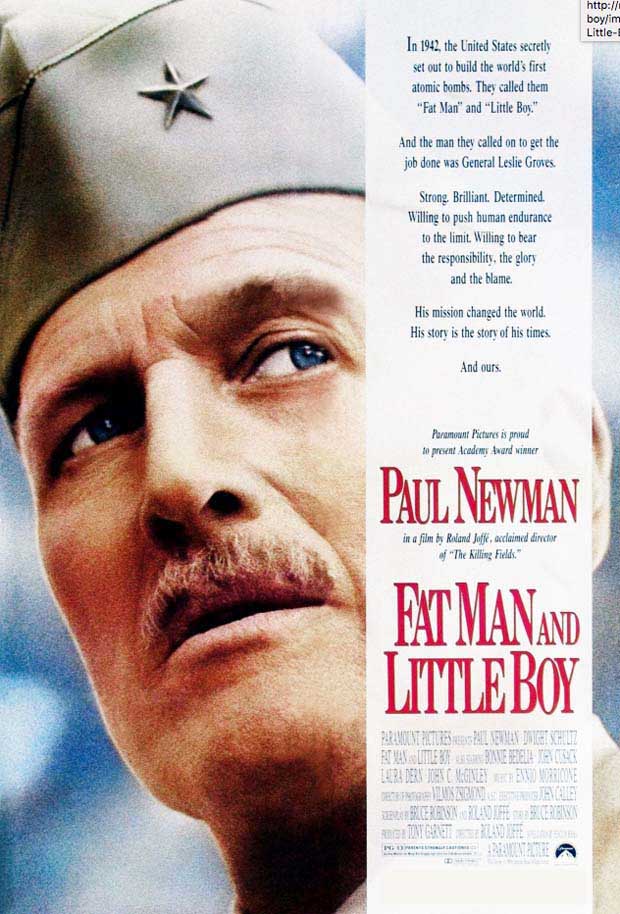Fat Man and Little Boy - 1989
Fat Man and Little Boy - Released Oct 20, 1989. Directed by Roland Joffe
Paul Newman (as General Leslie Groves) has the job of rounding up scientists and socking them away at Los Alamos in a secret compound so that they can conquer the technical difficulties of building an atomic bomb for use during World War II.
It's a historical movie trying to present real events which happened, but the political angle of late 20th-century thinking dominates the second half of the movie, with all of the anxiety about nuclear weapons coloring the words and actions of the 1940s personalities created onscreen.
The first half of the film contains the threat that Nazi Germany scientists will have completed an atomic weapon first, something the scientists, in hiding in New Mexico, realize as a genuine possibility which terrifies them. But later when it is revealed that the Nazis have botched their efforts and cannot hope to solve the difficulties of making the "gadget" work, the film flip-flops onto moral issues about whether the United States should have produced a bomb at all, or that is, why did these scientists, who have so many moral misgivings about making such a powerful weapon, proceed to do exactly that?
The movie's answer is the Paul Newman character of General Leslie Groves, who harangues and manipulates the geniuses in his command to get the job done so that it can be used on the Japanese, and to also incidentally save his military career as he has everything riding on the success of this expensive project, and as the film shows us, there are many personal enemies of Groves at the U.S. Pentagon who would be delighted if he failed.
Director Roland Jaffe has a lot on his hands, and the screenwriters (Bruce Robinson and Joffe) try to have their cake and eat it, too, by carving out a tale in which the primary focus is in the relationship between Newman's Gen. Groves and the lead scientist J. Robert Oppenheimer (played by Dwight Schultz), how they argue, fight and cooperate, and also the focus is on the problems the scientists faced, how they solved them, and what kind of relationships were happening between various members of the cast (between John Cusack and Laura Dern for example).
It is in this last category that the movie gets blurry, portraying a Hollywood love story amid the "real" events. It is also where we get short-changed on the lead star: the main characters (Shultz's Oppenheimer, and Cusack's Michael Merriman) have backgrounds and offscreen family members (or, onscreen, as we get to watch Oppenheimers extramarital affair add more tragedy to the tale). But our main star, Newman's Gen. Groves, has nothing except career-anxiety and the other officers at the Pentagon as his family (and they don't actually seem to like him much). As the movie starts to wind-down, this dehumanization of Groves continues apace* as if the director/writer wished his audience only to see the man as a sinister "sorcerer" who single-handedly created the atomic friction of the later 20th century just to "polish his brass."

*This is a shame, since the film starts nicely with Newman's General organizing the endeavor and solving problems, making the General seem a typical hardworking soldier, shouting at everyone to get the project rolling, much like, well, a movie director. In that context, it's hard to not like the character. But, the film keeps sending us messages that we're not supposed to like him. Which begs yet another question, why then have the general portrayed by the quite likeable Paul Newman?
Original Page May 20, 2016
What's Recent
- Something for the Boys - 1944
- The Mark of Zorro - 1940
- The Woman They Almost Lynched - 1953
- The Cat Girl - 1957
- El Vampiro - 1957
- Adventures of Hajji Baba – 1954
- Shanghai Express 1932
- Pandora's Box – 1929
- Diary of A Chambermaid - 1946
- The City Without Jews - 1924
- The Long Haul
- Midnight, 1939
- Hercules Against the Moon Men, 1964
- Send Me No Flowers - 1964
- Raymie - 1964.
- The Hangman 1959
- Kiss Me, Deadly - 1955
- Dracula's Daughter - 1936
- Crossing Delancey - 1988
- The Scavengers – 1959
- Mr. Hobbs Takes A Vacation - 1962
- Jackpot – 2024
- Surf Party - 1964
- Bad Boys Ride or Die - 2024
- Central Intelligence - 2016
- Cyclotrode X – 1966